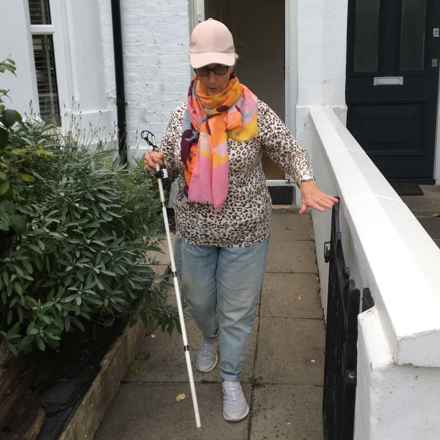“My white cane is absolutely essential – I wouldn’t be without it”
Posted: Friday 13 October 2023
When Julia and Irene (pictured) step out of their front doors, they do so with an air of confidence - and it’s all thanks to their white canes.
Not only has this handy aid helped give them confidence with their sight loss, it’s also become indispensable as it guides them through each of their days.
Julia said: “Life would be much harder without it.
“It is absolutely essential that I use it and I wouldn't be without it. I use it every time I go out. If I'm going on the bus or if I'm going shopping I take it with me all of the time.”
But, for Julia, it wasn’t always easy to admit she needed the support of a white cane. The 73-year-old was first diagnosed with diabetic macular oedema in 2012, but it was a few years before she came to terms with the fact she needed the support of a foldable, symbol cane.
Julia, from Bewdley, said: “I was worried about the stigma at the beginning because it makes you stand out. But, after using it, it's given me more confidence. I don't mind using it at all now, but I think everybody finds it difficult in the beginning.
“Now I don't leave home without it, it’s really useful and people are very helpful too when they see I have it. If you've got one, they're a lot more helpful to you than anything else.”
London-based Irene, who has age-related macular degeneration (AMD), agreed with Julia’s comments and praised the assistance she has received from strangers who have noticed her white cane.
Irene, pictured above leaving her home with white symbol cane in tow, said: “I felt very exposed at first, which wasn't a nice feeling, but I realised I had to persevere with it and now I'm quite comfortable using my cane.
“When I’m out with my sister she tells me it’s like the parting of the Red Sea because people take note of my cane and give me room. It’s impressive to her how accommodating people are, very obliging in general. Without it, people would just think that I'm being a ‘fuddy duddy’ and getting in their way or not moving quickly enough.
“But when they see the cane, then it gives them a certain understanding. It is amazing what a white cane can say to others and how helpful that makes it for me to get about.”
Seeing other people using their white cane has also been a big factor for Julia, who has seen her confidence grow after joining her local Macular Society support group.
She said: “I’ve got a lot more confidence using it. When I first got it, our group leader Jane would always tell me to use the cane more, and that was something that just got into my head.
“I go to the monthly meetings and what helped me was seeing other people with the cane and seeing how they were able to adapt. Seeing other people you know you're all one – if they can use the cane then so can I. You have to accept that and then get on with your life, you can't sit back otherwise you hang back.”
Sunday, 15 October 2023 is White Cane Awareness Day. The Macular Society is here to support you with your condition and help with tips for everyday living, such as how to obtain a white cane through local services.
If you are interested in using a cane and want more information about them, call the Macular Society Helpline on 0300 3030 111 or email help@macularsociety.org
What are the different types of canes?
Long canes - Long canes are typically used by people with restricted or low vision. They are held out in front of you, tapping the area ahead to detect any obstructions and navigate your route. Training is required before using them.
Symbol canes - Symbol canes are foldable and shorter than long canes, held by a person who has low but useful vision. The symbol cane is more practical to use in busier environments and is held to alert others of your visual impairment.
Guide canes - Guide canes are held in front of you, diagonally across your body to help you find approaching obstacles such as kerbs and steps.
All canes can include a red and white band on them to indicate you have both a hearing impairment as well as a sight loss condition.
